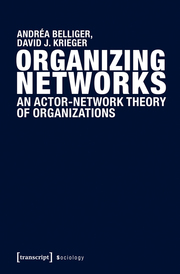Detailansicht
Organizing Networks
An Actor-Network Theory of Organizations, Sozialtheorie
ISBN/EAN: 9783837636161
Umbreit-Nr.: 9432439
Sprache:
Englisch
Umfang: 272 S.
Format in cm: 2 x 22.5 x 15
Einband:
kartoniertes Buch
Erschienen am 15.08.2016
Auflage: 1/2016
- Zusatztext
- What are organizations? Where do they come from? How are they transformed and adapted to new situations? In the digital age and in the global network society, traditional theories of the organization can no longer answer these questions. Based on actor-network theory, this book explains organizations as flexible, open networks in which both human and non-human actors enter into socio-technical assemblies by constantly negotiating and re-negotiating programs of action. Organizations are not macro social structures or autonomous systems operating behind the backs of individuals. Instead, they are scalable actor-networks guided by network norms of connectivity, flow, communication, participation, authenticity, and flexibility.
- Autorenportrait
- Andréa Belliger (Prof. Dr.) is co-director of the institute for Communication & Leadership, in Lucerne, and pro-rector of Pädagogische Hochschule Zentralschweiz. She is on the board of directors of various organizations in Switzerland and Germany in the areas of healthcare, finance and banking, social services administration, energy, and education. She is an expert consultant for business and government in all aspects of digital transformation. For many years she has done research on the social and cultural changes and challenges of the digital transformation. 2018/19 she was named among the Top 100 Women in Business in Switzerland and was nominated for the Female Digital Leader Award. David J. Krieger (Prof. Dr. habil. habil.), social scientist and philosopher, is a co-founder and co-director of the institute for Communication & Leadership, a private research and training institution, in Lucerne. He is author of many scientific articles and books and director of various MAS and MBA programs. His main areas of research are communication theory, systems theory, theories of new media, intercultural communication, network theory, organization theory, and digital ethics and philosophy. In 2000 he co-founded the institute for Communication and Culture at Universität Luzern, where he was also awarded the habilitation in science of religions and in communication science.
